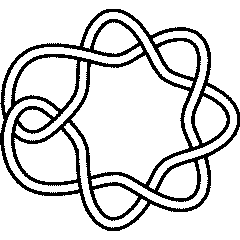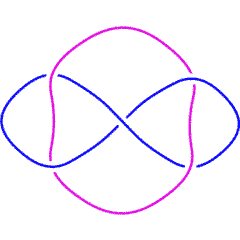The HOMFLY-PT Polynomial
The HOMFLY-PT polynomial (see [HOMFLY] and [PT]) of a knot or link is defined by the skein relation
and by the initial condition =1.
KnotTheory` knows about the HOMFLY-PT polynomial:
(For In[1] see Setup)
|
| ||||||||
Thus, for example, here's the HOMFLY-PT polynomial of the knot 8_1:
In[4]:=
|
K = Knot[8, 1];
|
In[5]:=
|
HOMFLYPT[Knot[8, 1]][a, z]
|
Out[5]=
|
-2 4 6 2 2 2 4 2
a - a + a - z - a z - a z
|
It is well known that HOMFLY-PT polynomial specializes to the Jones polynomial at and and to the Conway polynomial at . Indeed,
In[6]:=
|
Expand[HOMFLYPT[K][1/q, Sqrt[q]-1/Sqrt[q]]]
|
Out[6]=
|
-6 -5 -4 2 2 2 2
2 + q - q + q - -- + -- - - - q + q
3 2 q
q q
|
In[7]:=
|
Jones[K][q]
|
Out[7]=
|
-6 -5 -4 2 2 2 2
2 + q - q + q - -- + -- - - - q + q
3 2 q
q q
|
In[8]:=
|
{HOMFLYPT[K][1, z], Conway[K][z]}
|
Out[8]=
|
2 2
{1 - 3 z , 1 - 3 z }
|
 8_1 |
 L5a1 |
In our parametrization of the link invariant, it satisfies
where is some knot or link and where is the number of components of . Let us verify this fact for the Whitehead link, L5a1:
In[9]:=
|
L = Link[5, Alternating, 1];
|
In[10]:=
|
Simplify[{
(-1)^(Length[Skeleton[L]]-1)(q^2+1+1/q^2)HOMFLYPT[L][1/q^3, q-1/q],
A2Invariant[L][q]
}]
|
Out[10]=
|
-12 -8 -6 2 -2 2 4 6
{2 - q + q + q + -- + q + q + q + q ,
4
q
-12 -8 -6 2 -2 2 4 6
2 - q + q + q + -- + q + q + q + q }
4
q
|
Other Software to Compute the HOMFLY-PT Polynomial
A C-based program running under windows by M. Ochiai can compute the HOMFLY-PT polynomial of certain knots and links with up to hundreds of crossings using "base tangle decompositions". His program, bTd, is available at [1].
References
[HOMFLY] ^ J. Hoste, A. Ocneanu, K. Millett, P. Freyd, W. B. R. Lickorish and D. Yetter, A new polynomial invariant of knots and links, Bull. Amer. Math. Soc. 12 (1985) 239-246.
[PT] ^ J. Przytycki and P. Traczyk, , Proc. Amer. Math. Soc. 100 (1987) 744-748.









